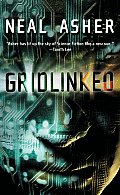
| Series: | Agent Cormac #1 |
| Publisher: | Tor |
| Copyright: | 2001 |
| Printing: | September 2004 |
| ISBN: | 0-765-34905-1 |
| Format: | Mass market |
| Pages: | 423 |
I had previously read several of Neal Asher's short stories in Asimov's Science Fiction, but this, his first novel, was also the first novel of his that I'd read. Gridlinked is set in the same Polity universe as the Gabbleduck stories, but not on the planet Masada (introduced in Line of Polity, the sequel). It follows Polity agent Cormac on his investigation of a runcible explosion that destroyed the inhabitants of a Polity world, and which appears due to sabotage. But Cormac has another problem: he's been connected, gridlinked, to the net for far too long and his emotions and ability to relate to humans are suffering. And for this mission he'll have to go off-line.
Gridlinked is, in genre, one of the gritty far-future action adventures that seem common from British authors recently. The space ships are rusty, biotechnology makes an appearance, and computer networks and AIs are central to the background, but the underlying plot is still a sophisticated version of solving problems and fighting wars at the edges of known space. The basic structure is almost as old as science fiction; the works succeed or fail on the strength of the characters and the bits of world-building and neat ideas around the edges.
In tone, Asher reminds me the most of Richard Morgan, particularly Broken Angels with its combat, small unit tactics, and heavily enhanced soldiers. Cormac has some of the same cynicism, but nowhere near as much, and Asher doesn't achieve the great hard-boiled tone of Morgan's work. Cormac starts the book as a bit of a whiner, made slightly more interesting by his "net addiction," and finishes the book as a fairly traditional hypercompetent agent who's still trying to figure out what's going on behind the scenes. In between, there's plenty of action and Asher keeps a good handle on the pacing, but I never cared about Cormac to the degree I cared about Kovacs. This matches my experience with Asher's short fiction: the weird bits of world-building are most of the draw, and I have a hard time connecting with his characters.
In the world-building department, there are lots of bits here, some of which connect and some of which don't. Much of the plot deals with a mysterious alien organism called the Dragon, with which Cormac has a history, and its games with humans and murky involvement in the runcible explosion. Asher does a good job at hinting at depths and long history that humanity is beginning to notice, but there's little resolution in this book. Most of this is left as sequel material, abruptly enough that the ending felt like the kind of teaser panels that end comic books and push you to buy next month's issue. Despite the frustration, though, I was intrigued by what Asher did show (and have been intrigued by his short stories), so it may get me to read on.
In typical first-book fashion, Asher does throw in a truck-load of technological bits and neat small ideas. Androids with artificial personalities play an important role in warfare and have their own psychoses, Cormac's Shuriken (one of a whole family of smart weapons by a famous weapon designer) is a great speechless sidekick character as well as a neat weapon idea, and Asher makes good plot use of AIs. And Asher does love his monsters and creates them at scale. The Dragon, the Maker, and Mr. Crane walk the border between explainable SF aliens and horrific or sociopathic monsters, reminding me somewhat of China Miéville (although Asher lacks Miéville's beautiful prose and vivid descriptions). It reinforces the feel of Gridlinked as an updated, modernized, and ambiguous version of a very old SF pattern: the human agent against the monstrous aliens.
I was less than satisfied with the characters and the ending but enjoyed Asher's imagination. If there had been more resolution around the Dragon and the Maker, I'd feel more comfortable recommending this one. As-is, it's good for a first novel, flawed but quite entertaining. If you're in the mood for fairly violent SF special agent fiction, you could certainly do worse.
Followed by Line of Polity.
Reviewed: 2007-09-16